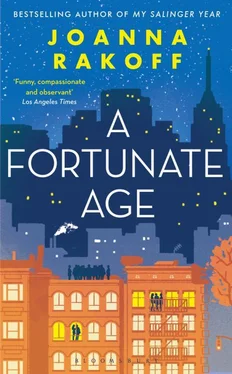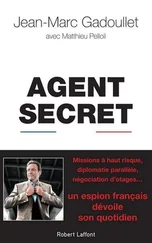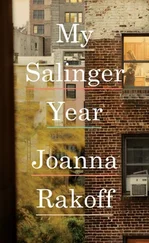In Rochester, Dave’s plans for hard-core dating—not to mention any semblance of a normal social life—were quickly thwarted. There was no one even remotely datable. He spent nights on the phone with Beth, listening to tales of Milwaukee, a town that seemed vaguely more exciting than Rochester, which bothered him. In mid-December Beth obtained a “best friend,” named Glyn, a Brit who’d actually crossed the pond to write his dissertation on Gilligan’s Island or some other such absurdity. Suddenly Glyn’s name came up every five minutes—“Glyn’s mom came to visit and brought us Marmite. Marmite , Dave!”—and Dave decided it was over, Beth could no longer call him at four in the morning to tell him she was lonely. He was always wondering if Glyn was in the other room, sleeping, incapable of properly quelling the particular loneliness of a Jewish girl from Scarsdale. And he could not call her either. No, he most certainly could not. Dave’s mother worked for PBS, after all, so what was he doing mooning over a girl who sought meaning in, like, Hollywood Squares ?
He started hanging around with the queens—who were, he saw, just like his Oberlin friends, cynical and bitter and frighteningly smart—and spent his weekends at Rochester’s gay clubs, of which there were surprisingly many. He took up smoking for real, buying cartons of Basics, and he ignored the messages that piled up on his machine, from his mother, from Tal, from Beth, and from Evelyn, who always managed to make him feel like an ass. “Dave, did you get my email,” she’d say, modulating her voice so as not to seem irritated. “I’m wondering if you’re coming home for Grandma’s eightieth birthday party in March.”
That summer—and the three that followed—he stayed at Tal’s place in Williamsburg and waited tables at a Southern restaurant on Cornelia Street. He tried to pretend his parents lived in a different city—half ashamed, half proud that he’d ignored them all year—and spent most of his time alone, actively not doing what he should have been doing, which was, of course, practicing. Some nights, half drunk from the staff round that commenced at midnight, after the kitchen closed, he’d walk home, across Houston, then Delancey, and up and over the Williamsburg Bridge, a fat roll of cash bulging in his pocket. At the dead center of the bridge, he’d stop and rest, his buzz worn off, and peer out over the railing at the tall buildings that lined the Manhattan bank of the East River, inside one of which lived Sadie’s aunt Minnie, an ancient, balding schoolteacher, fiercely devoted to Sadie, having never had any children of her own. He’d gone with Sadie to visit her a few times—she loved young people—in her boxy apartment, overfilled with Judaica and peeling, dark-veneered furniture, and left feeling virtuous and terribly, horribly alone. Later, when his grandmother died, he wondered why he’d never thought to bring Sadie out to visit her, or even to visit her at all, unaccompanied by his parents. And why hadn’t he gone home for her birthday in March?
Each August, his coffers replenished, he’d return to Rochester, sick with excitement and anxiety, certain the next semester would mark his triumph, his ascendance. Instead, he fell further and further behind, racking up record numbers of incompletes and incurring the wrath and, even worse, disappointment of his professors. After the fourth year of this, he drove back, once again, to Rochester, and instead of unloading his summer stuff, he silently packed up his winter stuff and his books and drove back to New York, steering his car to his parents’ apartment, rather than Tal’s, for this year, he knew, Tal had been glad to see him go, though their paths had barely crossed: Tal had been out of town half the time, on location in Vermont, and when he was in town, he was always making plans with Sadie, plans that didn’t include Dave, though, of course, they always said “Come along” as they headed out the door. It was the fall of 1998, a month before Lil’s wedding. His mother happened to be at the front window when he pulled up, and ran downstairs, he thought, to greet him. Instead, he received a look of cold fury, her thin lips pressed into an even thinner line. She knew. “This is just like you!” she said grimly. “To quit right before you’re finished. What is wrong with you?” He shouted something back—trying to ignore the fact that she was crying—something about never having wanted to go to Eastman, having done it for her and Dad, because everyone expected him to, though he didn’t know if this was true or not, he just knew it would hurt her. And, of course, it had . “Well, you’re not staying here,” she’d shouted. He’d gone around the corner to Sadie’s, though she didn’t seem particularly happy to see him either. A week later, he’d moved into Jake Martin’s dusty apartment, selling his car to cover the security deposit. Three months later, in January, he’d bought his place. Which meant, he supposed, that he was back for good. This was his life.
Over his ten months in New York, he’d settled into a dissolute routine of sorts. The piecemeal way in which he earned money meant that each day was markedly different from the next: On Sundays, he spent most of the day practicing with the band—they were calling themselves Anhedonia, though they worried that was too much of a cliché—in the space they rented in DUMBO, a cement-floored room in a warehouse that had been converted into studios. On Mondays, he attempted to lay out the principles of music theory for a small but terrifying bunch of students at Queens Community College. Though he only taught one two-hour class, the task generally consumed his entire day, as it took him a good ninety minutes to get out to the college, which was only accessible via a chain of obscure city buses. After class, he stayed and fooled around on the piano in his classroom, access to a half-decent instrument being the one perk of this awful job. (He’d hated practicing at Eastman, when it had mattered, but now he looked forward to it, if only because it was preferable to getting on the bus and making the slow journey back to Brooklyn.) Tuesdays and Wednesdays he stayed at home, recovering from his trip to Queens, and doing whatever copying work he had at the time. This was a tedious, detail-oriented business—often done by composition students desperate for extra cash—which entailed taking a large piece of music (a symphonic score or some such thing) and copying out, by hand, the parts for separate instruments (anywhere from four to sixty). One major score could take him months. In a bizarre, masochistic way, Dave enjoyed the coolie labor of copying, even though the scores he was copying were usually the worst derivative sort of crap. He loved the sight of the fresh black ink on the clean white page, and it was pleasurable to pattern out the beautiful, curving notes. He’d generally memorized parts of the pieces by the end, crappy though they were.
Thursdays, Fridays, and Saturdays, he worked at a popular restaurant on Smith Street called Madame Woo’s, a cross between a traditional bistro—white tile floor, cloudy gilt-framed mirrors, Parisian street signs, black-and-white photos—and a Midwestern Chinese joint, with purposefully tacky red vinyl booths, a kitschy drinks menu, and a weird assortment of pan-Asian antiques. Thursdays and Fridays, he worked the main dining room, which was filled with older couples eating multicourse meals and moaning about real estate. Saturdays, he covered the front bar, in which girls of his own age perched on bamboo stools at the high tables by the front doors, watching the passers-by or perhaps desiring to be watched themselves, in their sundresses and capri pants and tank tops. In the room’s dark interior, similar girls clustered around small tables, talking animatedly to one another over watermelon margaritas and square plates of Vietnamese ravioli. These women inevitably flirted with him, often in an adorable, sweet, shy manner, as though they were simply bowled over by Dave’s particular charms and didn’t make a habit of throwing themselves at waiters. Among them, sometimes, was his upstairs neighbor, Katherine, flanked by two pretty friends, who always insisted on shouting something that managed to be both offensive and flattering, “I can’t believe you really work here! You just don’t seem like a waiter.” “Well, I am,” Dave would say. “Which makes me uniquely qualified to tell you about our specials. We have a nice roast duck in red curry sauce…” And the girls at the neighboring tables would lean in to hear what he was saying to these lucky friends of his, to see if he was somehow giving them preferential treatment.
Читать дальше












